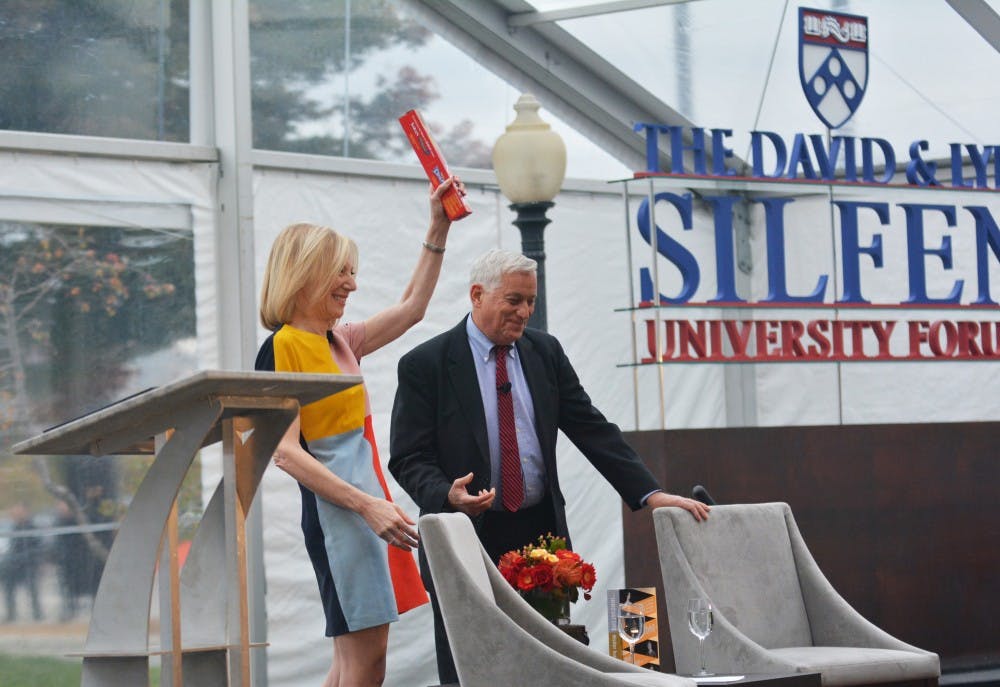While the concept of innovation might evoke images of computers, startups and engineers, it increasingly impacts faculty in all disciplines at Penn.
At the groundbreaking of the new Pennovation Center at the end of October, Penn President Amy Gutmann said innovation could come to play a role in faculty tenure decisions — a sentiment that Provost Vincent Price echoed.
“Innovation and impact are centrally implicated in faculty hiring, promotion and tenure,” Price said in an email. “Primary responsibility for developing and maintaining a high-quality faculty rests with the individual disciplines. But, across the diverse forms of scholarly activity at Penn, the schools share clear expectations that our researchers will both push forward the frontiers of knowledge and maximize the impact of that work.”
Some areas of academia — the hard sciences, health sciences, engineering and computer science — come to mind more readily when mentioning commercialization. For professors in the liberal arts, innovation is defined more loosely.
“Our deans want to take into account all the ways in which faculty’s research is impactful in the world. Some of that research, like my own, is totally uncommercializable,” Gutmann — a political theorist — said. “But it’s the impact that research has and potentially has that is something that we take into account.”
Classics professor Peter Struck said that in his field, innovation takes the form of reinterpretation of past materials. He noted that society-altering insight — female suffrage, for example — stemmed from the revelations of leaders in the humanities.
Struck said that in his field of study, tenure is acquired through intensive peer review, and he thought a push for innovation would have little effect.
“That’s the way it’s always been, and that’s the way it’s going to continue to be,” Struck said. “Never have I received a cue or even an inclination from someone in another place at the University saying I should explore a particular idea. Knowledge is not produced hierarchically.”
But technology has contributed to the evolution of the humanities, said Vice Provost for Research Dawn Bonnell . In 2012, the School of Arts and Sciences launched the Digital Humanities Forum to explore how computer technologies impact scholarship and teaching in the humanities.
In the social sciences, there are many examples of research that can be commercialized directly — such as “research on increasing political participation, best polling practices and the analysis of political risk,” political science professor Marc Meredith said. “But, in the aggregate, I would expect less political science research to be commercialized than in fields like computer science or engineering.”
Meredith received tenure earlier this year, after being an assistant professor at Penn for five years. He said the process is relatively opaque, but involves having one’s work evaluated by all levels of the University. Opinions of senior professors in the field and current and former students are also taken into account.
“Commercial impact is one of many forms of impact that should be considered as part of the tenure process,” Meredith said.
Penn also offers institutional resources — in the form of the Penn Center for Innovation — to help researchers transform their ideas into marketable products.
“This is for faculty who want to do so, and to enable them to do so,” Gutmann said. “We value social impact at the University across the whole spectrum of intellectual creativity, and sometimes some forms of intellectual creativity can be brought into the marketplace.”
In the past six years, the number of Penn-affiliated commercialism agreements has exploded by 600 percent to 327 agreements this year, and over 20 new start-up companies based on faculty ideas have attracted $20 million of outside investment, according to the University.
The Engineering Entrepreneurship Program, founded in 1999, has grown in enrollment by over 5,000 percent since its inception. The program consists of two courses intended to introduce students to the knowledge and skills they would need to commercialize their work. While some of the program’s students — including the creator of Venmo — have gone on to start successful entrepreneurial ventures, others have not.
“[Commercialism] isn’t our objective,” said professor of practice Tom Cassel , the program’s director. “You never know at what point in your career the opportunity is going to cross your path.”
As a professor of practice, Cassel — who spent years prior to Penn as co-founder and CEO of an independent electric power company — is not tenured faculty, nor is he on the tenure track.
Despite the program’s focus on students, however, Cassel said that faculty from across the University have approached him seeking entrepreneurial advice into how to commercialize their research.
In recent years, private-sector companies that used to invest in basic research are looking to universities to make discoveries that can be turned into products.
“Universities and medical systems have become the economic engines of the country, much more so than we were 50 years ago,” Gutmann said.



